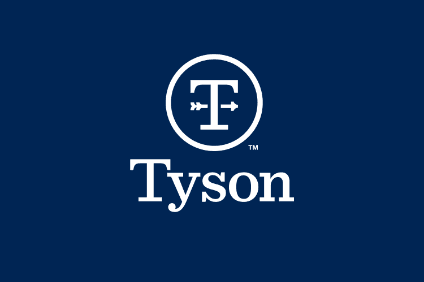
A day after announcing production would re-start at one coronavirus-hit plant in the US, Tyson Foods said today (22 April) it would stop output at another.
Tyson plans to “indefinitely suspend operations” at a pork facility in Waterloo, Iowa, this week.

Discover B2B Marketing That Performs
Combine business intelligence and editorial excellence to reach engaged professionals across 36 leading media platforms.
The meat-processing behemoth has been facing calls to close the plant, which is the company’s largest in the pork sector, amid claims a spike in cases locally is linked to staff at the facility testing positive.
Tyson said today the factory had been “running at reduced levels of production due to worker absenteeism”, adding it will “stop production mid-week until further notice”.
The company said: “The facility’s 2,800 team members will be invited to come to the plant later this week for Covid-19 testing.”
In a statement, Steve Stouffer, group president of Tyson Fresh Meats, said: “Protecting our team members is our top priority and the reason we’ve implemented numerous safety measures during this challenging and unprecedented time. Despite our continued efforts to keep our people safe while fulfilling our critical role of feeding American families, the combination of worker absenteeism, Covid-19 cases and community concerns has resulted in our decision to stop production.”

US Tariffs are shifting - will you react or anticipate?
Don’t let policy changes catch you off guard. Stay proactive with real-time data and expert analysis.
By GlobalDataThe company did not disclose how many staff at the Waterloo plant had contracted the novel coronavirus.
Stouffer added: “The closure has significant ramifications beyond our company, since the plant is part of a larger supply chain that includes hundreds of independent farmers, truckers, distributors and customers, including grocers. It means the loss of a vital market outlet for farmers and further contributes to the disruption of the nation’s pork supply.”
Last week, Smithfield Foods, one of the world’s largest pork producers, closed “until further notice” one of its biggest production facilities in the US amid what are reported to be dozens of positive cases of Covid-19 among staff.
This week, Brazil’s JBS said it would shut down its pork processing plant in Minnesota run by its US subsidiary after seven workers tested positive for Covid-19.
Scaled-down production at Tyson’s fresh beef and pork facility 120 months south in Columbus Junction started yesterday. Manufacturing at the plant was suspended two weeks ago because of a number of Covid-19 cases, and, according to reports, some deaths.
On 6 April, Arkansas-based Tyson said more than “two dozen” employees had contracted Covid-19 at the facility, and, according to a Fox Business report, two of them later died.
Meanwhile, The Associated Press has reported three people have also passed away from Covid-19 at Tyson’s poultry facility in Camilla, Georgia.
In today’s statement, Tyson said its other meat and poultry plants continue to operate, although some are running at reduced levels of production “either due to the planned implementation of additional worker safety precautions or worker absenteeism”.
The company added: “Tyson Foods has been focused on Covid-19 since January when it formed a company coronavirus task force. It has since implemented numerous measures to protect workers. It was one of the first food companies to start taking worker temperatures. The company started efforts to secure a supply of protective face coverings before the CDC [The Centers for Disease Control and Prevention] recommended them and now requires their use in all facilities. In an effort to promote social distancing, plants like Waterloo have installed workstation dividers and are providing more breakroom space.”
There has been criticism among worker representatives over how parts of the US meat industry has reacted to Covid-19.
The Retail, Wholesale and Department Store Union has been critical of what it has said has been the US poultry sector’s “delayed response” to Covid-19, claiming companies were “leaving most workers unprotected”.
In response, trade association The National Chicken Council has insisted its members take “very seriously our responsibly to keep workers safe while providing protein for families”, with a spokesperson telling just-food last week the industry “began increasing efforts to protect workers even before the virus started spreading more than a month ago”.
Analysis, 15 April: Meat processing emerges as Covid-19 hot-spot in North America





